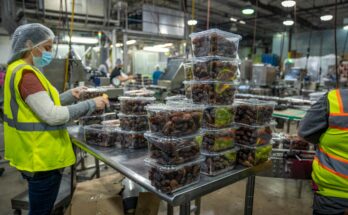Italy’s agriculture sector plays a significant role in the country’s economy, offering many job opportunities for both locals and foreign workers. From the vineyards of Tuscany to the fruit orchards of Sicily, farm worker jobs in Italy are always in demand, especially during the harvesting seasons. For many foreigners, working on Italian farms provides not only a stable job but also an opportunity to experience the country’s beautiful countryside, rich culture, and welcoming communities.
In this guide, we’ll cover everything you need to know about farm worker jobs in Italy, including visa requirements, job types, salaries, and application tips.
Visa and Work Permit Requirements
Foreign nationals who are not citizens of the European Union (EU) will need a valid work visa to be employed legally in Italy’s agricultural sector. The Italian government issues a specific visa for seasonal agricultural work known as the Seasonal Work Visa (Nulla Osta per Lavoro Stagionale).
The process begins with an Italian employer offering you a job contract. The employer then applies for authorization (Nulla Osta) from the immigration office. Once this is approved, you can apply for a seasonal work visa at the Italian consulate or embassy in your home country. After arriving in Italy, you must apply for a residence permit (Permesso di Soggiorno) within 8 days to complete your legal status.
This seasonal visa typically allows you to work for up to 6 to 9 months, depending on the contract. Some workers return each year for seasonal employment, while others may transition into long-term opportunities if available.
Types of Farm Worker Jobs Available
The Italian agriculture sector is diverse, offering many different types of jobs depending on the season, region, and type of crops being grown.
Fruit and Vegetable Picking
During the harvesting season, farms hire large numbers of workers to pick fruits like grapes, apples, peaches, strawberries, and oranges. Vegetable farms also hire workers to harvest crops such as tomatoes, zucchinis, and peppers.
Vineyard Work
Italy’s wine industry relies heavily on seasonal workers to pick grapes, maintain vines, and support wine production. The grape harvest typically takes place between August and October, depending on the region.
Olive Harvesting
In the autumn months, many farms hire workers to pick olives, which are then used for Italy’s famous olive oil production.
Greenhouse and Nursery Work
Some farms operate year-round growing flowers, herbs, and vegetables in greenhouses. These jobs may involve planting, watering, pruning, and packing.
Livestock Farming
Jobs are also available on livestock farms, including dairy farms, poultry farms, and sheep farms. Duties may include feeding animals, cleaning barns, milking cows, and general farm maintenance.
Where Are Farm Worker Jobs Available in Italy?
Farm work is available throughout Italy, but certain regions offer more opportunities depending on the type of agriculture practiced there.
-
Tuscany: Known for vineyards, olive groves, and vegetable farms.
-
Sicily: Famous for citrus fruits, grapes, and vegetables.
-
Puglia: Major producer of olives, grapes, and vegetables.
-
Veneto: Known for apple orchards, vineyards, and dairy farms.
-
Lombardy and Emilia-Romagna: Rich in dairy farming, fruit picking, and greenhouse work.
During harvest seasons, these regions actively seek seasonal workers to meet labor demands.
Basic Requirements to Work as a Farm Worker
While many farm worker jobs do not require high levels of education or professional experience, there are still some basic requirements that foreign workers should meet.
-
Valid Work Visa and Residence Permit: Legal documentation is essential for employment.
-
Physical Fitness: Farm work often involves long hours of standing, bending, and lifting.
-
Willingness to Work Long Hours: Especially during harvest season, working 8-12 hour shifts is common.
-
Basic Italian Language Skills: While not always mandatory, knowing some Italian helps with communication and understanding instructions.
-
No Serious Health Issues: The physical nature of the work requires good overall health.
-
Clean Criminal Record: Employers may request background checks for certain positions.
How to Find Farm Worker Jobs in Italy
There are several ways to search for farm jobs as a foreigner:
1. Online Job Portals:
Websites like Indeed Italia, Subito.it, Monster.it, and Jobrapido often post seasonal farm job listings.
2. Government Programs:
Italy’s annual Decreto Flussi program allows thousands of non-EU workers to legally enter the country for seasonal agricultural work. Many employers recruit directly through this program.
3. Recruitment Agencies:
Agencies such as Adecco, Randstad, and Manpower sometimes have openings for agricultural workers.
4. Direct Contact:
Some farms post job opportunities on their own websites or hire directly through personal referrals and word-of-mouth, especially in rural areas.
5. Expat and Migrant Communities:
Online expat forums and Facebook groups often share information about seasonal work opportunities.
Salary Expectations for Farm Workers in Italy
Salaries for farm work in Italy depend on the type of job, location, and number of hours worked. On average:
-
Seasonal fruit and vegetable pickers typically earn between €900 and €1,300 per month.
-
Vineyard workers may earn €1,000 to €1,500 per month during harvest season.
-
Greenhouse and livestock workers can earn between €1,200 and €1,600 per month, depending on experience and the type of work.
Some employers also provide free or discounted accommodation and meals for workers, which can help reduce living expenses.
Cost of Living for Farm Workers
The cost of living for farm workers varies depending on where they live and whether accommodations are provided by the employer.
-
Rent: €300 to €600 per month in rural areas.
-
Utilities: €50 to €100.
-
Groceries: €150 to €300.
-
Transportation: €20 to €60.
-
Personal Expenses: €50 to €100.
Since many farms are located in rural areas where living costs are lower, farm workers often find that their income allows them to save money, especially if housing and meals are included.
Working Conditions and Responsibilities
Farm work in Italy can be physically demanding, often requiring long hours under the sun or in greenhouses. During peak harvest periods, workers may work six days a week. However, many workers find the experience rewarding and enjoy the outdoor work environment.
Typical responsibilities include:
-
Planting, watering, and harvesting crops.
-
Operating farm machinery and tools.
-
Sorting and packing fruits and vegetables.
-
Feeding and caring for livestock.
-
Maintaining farm equipment and facilities.
Safety regulations are in place to protect workers, but it’s important to follow guidelines, use protective gear, and take proper rest breaks to prevent injuries.
Language Requirements
While some employers may accept workers with limited Italian skills, having at least basic Italian knowledge is highly beneficial. It allows you to better understand job instructions, communicate with supervisors, and adapt more easily to living in Italy. Many employers also appreciate workers who show a willingness to learn the language.
Frequently Asked Questions
Can foreigners apply for farm worker jobs in Italy?
Yes, Italy actively recruits foreign seasonal workers through official programs like Decreto Flussi.
Is previous experience necessary?
Not always. Many farm jobs offer on-the-job training for new workers.
Is farm work in Italy full-time or seasonal?
Most farm jobs are seasonal, but some positions are available year-round, especially in greenhouses and livestock farming.
Do I need to speak Italian?
While not mandatory for all jobs, basic Italian helps greatly with daily communication.
Can I apply without a job offer?
Generally, you will need a job offer to apply for a seasonal work visa.
Conclusion
Farm worker jobs in Italy provide a fantastic opportunity for foreign workers to experience the country, earn a steady income, and contribute to one of Italy’s most important industries. With proper legal documentation, physical readiness, and a willingness to work hard, you can successfully start your journey as a farm worker in Italy.
By following the official procedures, staying informed about seasonal work programs, and actively searching for opportunities, you can secure a job that not only supports your financial goals but also offers a unique cultural experience in the heart of Europe.



